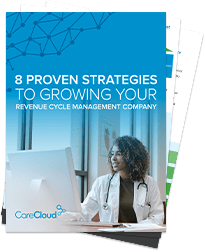Healthcare providers have been forced to reevaluate their approach to revenue cycle management due to the transition towards value-based compensation and more comprehensive patient care.
Ineffective billing practices can result in financial losses and compromise the ability to deliver high-quality care. This is where revenue cycle management comes in.
It is a process that helps companies to identify, track, collect, and process revenue generated by their services.
What is Revenue Cycle Management?
Revenue cycle management (RCM) involves discovering, collecting, and managing a healthcare organization’s revenue. It entails all steps involved in capturing, managing, and collecting patient service, from appointment scheduling to payment. A successful revenue cycle process is crucial to ensure the financial health of a practice.
RCM plays a vital role in healthcare organizations by ensuring the smooth flow of financial transactions and optimizing revenue capture. Efficient revenue cycle management requires a deep understanding of healthcare regulations, coding guidelines, medical billing and coding and reimbursement systems and implementing efficient systems and technologies to streamline processes.
Healthcare organizations can improve financial performance, increase cash flow, minimize billing errors, and enhance patient satisfaction by focusing on revenue cycle management.
How AI is Revolutionizing Revenue Cycle Management
AI has completely revolutionized the healthcare landscape, including revenue cycle management. It’s no secret that the revenue cycle management process has become increasingly difficult.
Since RCM has become more complex due to certain variables, including patient financial responsibility, complex payer contracts, and the shift to value-based payments, healthcare organizations have trouble collecting payments.
With the help of AI, these complexities have become easier to solve. Some of the most common ways AI can transform RCM are:
Claim Denials
Denied claims can make a practice lose a lot of money. With the help of AI, practices can actively identify errors in claims. With the help of AI-powered RCM, revenue cycle managers can develop a more focused denial management strategy that results in faster payouts.
Denials can be avoided by utilizing AI with pre-submission skills that help resolve authorization issues.
AI can also play a part in your denial management strategy by supporting teams in identifying which denials are more likely to be handled promptly.
This will allow you to allocate resources to the claims most likely to be reversed.
Revenue Capture
Even though charge capturing is the most important part of revenue cycle management, most providers still need help with coding and documentation.
A more thorough claim can be made and paid on time using AI to help identify missing charges before claims are filed.
Additionally, AI can be used in place of time-consuming, hard-to-maintain rule-based methods.
Patient Experience
Patient experience directly impacts patient outcomes. Patients who have an effortless time at the clinic are more likely to trust the provider.
By automatically identifying those eligible for financial aid and providing the desired price transparency, AI is helping to improve patients’ financial experience.
AI is helping patients understand how much their visit will cost before they arrive.
Authorization
Many medical practitioners concur that prior authorization is the most difficult part of revenue cycle management.
Prior authorizations are practically the ideal application for AI because of their transactional nature.
AI can swiftly identify cases requiring prior authorization with machine learning and real-time analytics, saving a tonne of time with revenue cycle management in the healthcare industry.
Patient Setting
Each patient requires a different healthcare environment, but thanks to AI technology, the most effective setting is chosen using advanced technologies based on a patient’s data.
It provides a thorough case analysis and indicates whether inpatient or outpatient care would better serve an individual patient.
With AI, you can swiftly assess all the risk factors associated with the patient environment and make a data-driven decision.
Advantages of AI in RCM
Revenue cycle management has never been the same since the AI revolution. Where practices lost money over denied claims, AI has completely changed the RCM game. AI has benefitted RCM in the following ways:
- It increases revenue growth by reducing claim errors.
- It increases processing speed and accuracy.
- AI ensures no data is lost during patient registration or any other crucial revenue cycle management phases.
- AI will automatically integrate modifications and upgrades to medical billing. This technology prevents errors and denials while keeping the medical facility current.
Conclusion
AI has overtaken every industry, and healthcare is no exception. AI-powered healthcare solutions have single-handedly dealt with the complications of healthcare processes. Such a process is RCM. AI-powered RCM has benefitted providers by increasing financial revenue and improving patient outcomes.
CareCloud’s robust AI-powered revenue cycle management software helps providers navigate the complexities of RCM and strengthen the financial health of practices.




